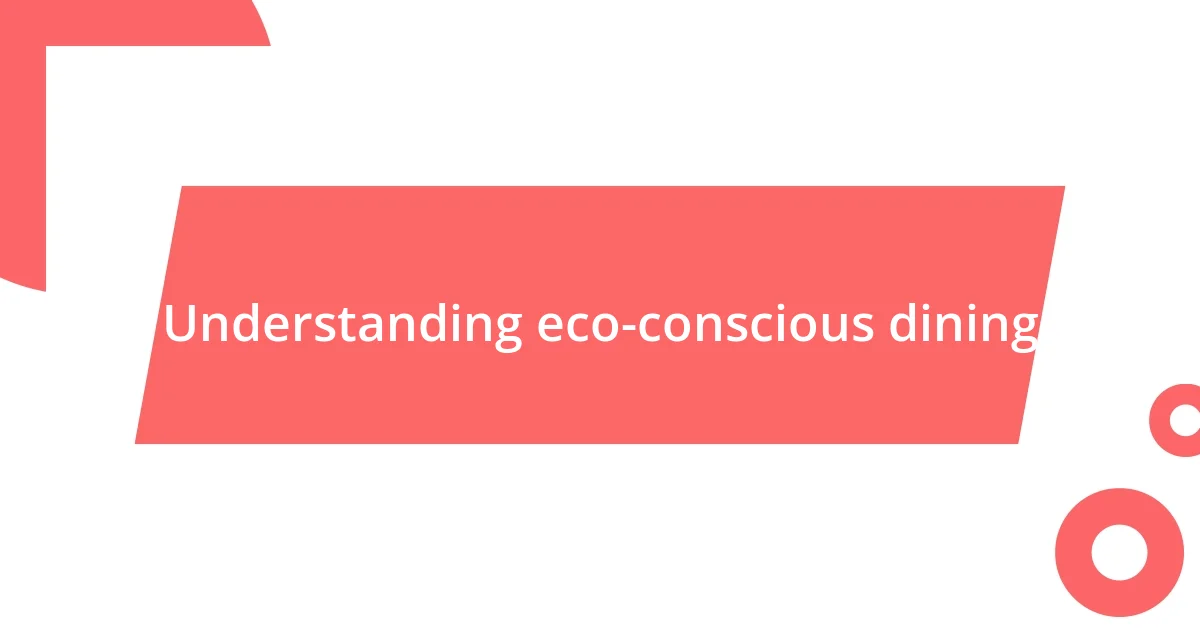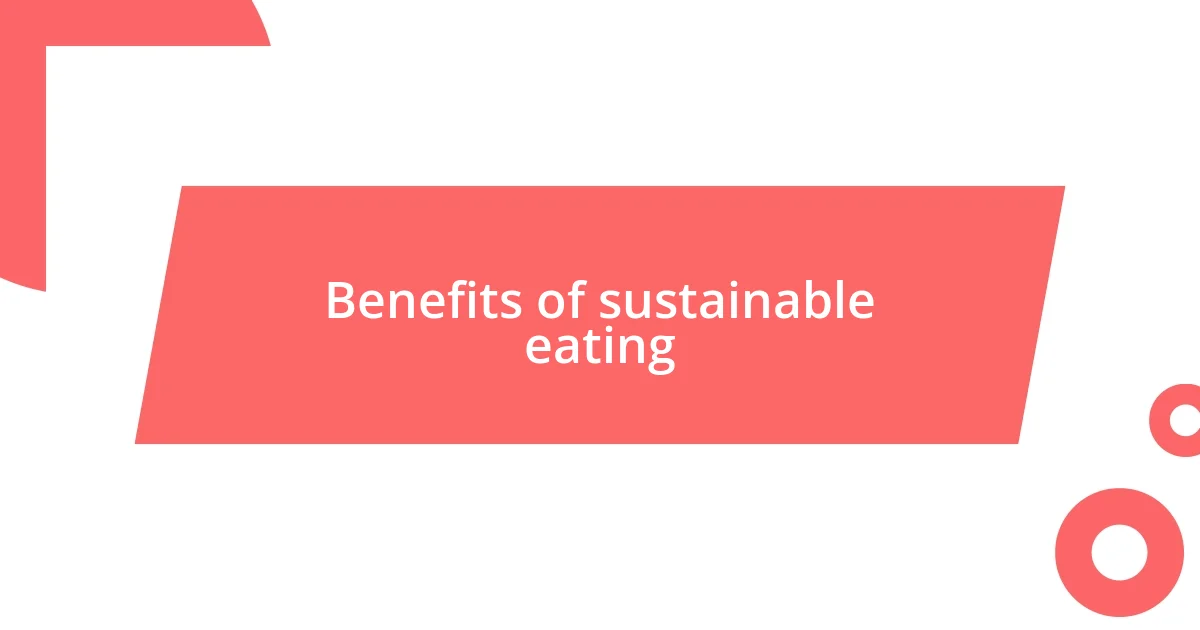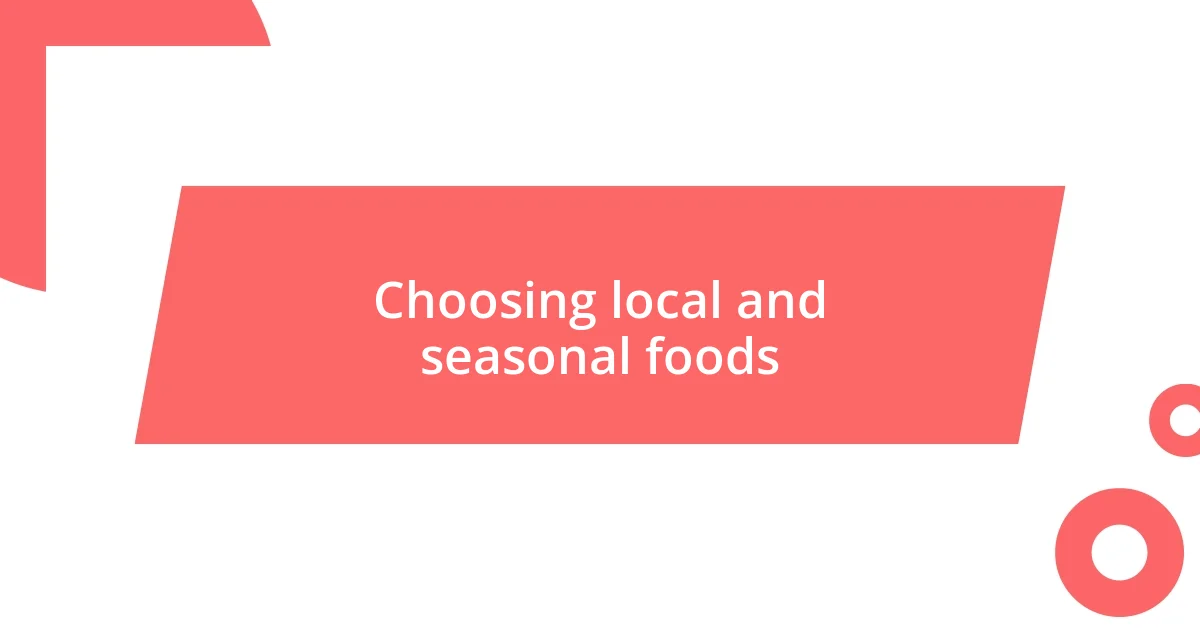Key takeaways:
- Eco-conscious dining enhances the connection to food sources, promotes sustainability, and reduces carbon footprints through local and seasonal ingredient choices.
- Incorporating plant-based meals boosts creativity in cooking and fosters a deeper appreciation for the environment and nutritional diversity.
- Supporting ethical food businesses enriches the dining experience by creating community ties, promoting sustainable practices, and ensuring that food choices reflect personal values.

Understanding eco-conscious dining
When I first encountered the concept of eco-conscious dining, it felt like a light bulb moment. I realized it’s not just about what’s on my plate, but also the journey my food takes to get there. Have you ever stopped to think about how many hands touch our food before it reaches us?
I remember visiting a farm-to-table restaurant where I had the chance to meet the farmers who grew my meal. Knowing they prioritized sustainable practices made my dining experience richer and more fulfilling. Isn’t it amazing how much more connected we can feel when we understand the origins of our food?
Eco-conscious dining embraces sustainability by considering factors such as ingredient sourcing, nutritional value, and waste production. By opting for local, seasonal ingredients, I’ve learned that not only do I support my community, but I also reduce my carbon footprint. It’s a small shift with a big impact—couldn’t we all use a little more consciousness in our choices?

Benefits of sustainable eating
Sustainable eating is not just a trend; it’s a lifestyle that offers numerous benefits. For me, the most rewarding aspect has been the improvement in my overall health. When I started choosing organic produce and local products, I noticed a significant boost in my energy levels and mood. There’s something undeniably satisfying about knowing the food I’m consuming is free from harmful pesticides and comes from ethical sources. Plus, I feel good about supporting farmers who prioritize the planet.
Here are some key benefits of sustainable eating:
- Enhanced Health: Emphasizing fresh, organic ingredients can lead to improved nutrition and well-being.
- Environmental Impact: Choosing locally sourced foods reduces transportation emissions and promotes biodiversity.
- Community Support: By selecting local vendors, I actively contribute to my community’s economy, forging connections that enrich my social fabric.
- Waste Reduction: Sustainable practices often incorporate strategies to minimize food waste, helping to divert waste from landfills.
- Better Taste: I’ve often found that seasonal produce simply tastes better, bursting with flavor and freshness that is hard to replicate.
Engaging in this journey has not only transformed the way I dine but has also heightened my appreciation for the environment and community around me.

Choosing local and seasonal foods
Choosing local and seasonal foods has profoundly shaped my culinary experiences. The last time I visited a local farmer’s market, I remember the burst of excitement I felt picking out vibrant, fresh tomatoes. They weren’t just ingredients; they were products of hard work and care from my neighbors. The flavor difference is astonishing! I find that dishes made with seasonal ingredients are not only fresher but also taste remarkably more vibrant than their out-of-season counterparts.
I’ve also noticed that eating locally fosters a sense of community. Connecting with local farmers and producers creates an environment of trust and shared values. For example, I recall chatting with a farmer about the challenges of sustainable growing practices. Hearing their passion for what they do reinforced my commitment to supporting local agriculture. It’s a tangible way for me to contribute to a more sustainable food system, making every meal a shared celebration of our hard work in the community.
Lastly, seasonal eating encourages variety in my diet. Different times of the year bring different flavors to the table. When autumn rolls around, I can’t get enough of pumpkin and squash dishes, or when spring arrives, the asparagus and fresh herbs take center stage. This rotation not only excites my palate but also adds nutritional diversity to my meals. Isn’t it fascinating how nature provides exactly what we need, season by season?
| Characteristic | Local Foods | Non-Local Foods |
|---|---|---|
| Freshness | Typically fresher and tastier | Often less fresh due to long shipping distances |
| Nutritional Value | Higher nutritional content | Potential nutrient loss during transportation |
| Environmental Impact | Lower carbon footprint | Higher carbon emissions from transportation |
| Economic Support | Supports local farmers and economy | Less benefit to local economies |

Reducing food waste tips
One effective way to reduce food waste that I’ve embraced is meal planning. Each week, I sit down with a notepad and jot down what I already have in my pantry, which helps me to craft meals that utilize those ingredients. Just last week, I used up some wilting spinach by tossing it into a delicious frittata. Not only did I avoid wasting food, but I also created a nourishing dish that sparked joy in my kitchen. Isn’t it satisfying to know you’re making the most out of what you have?
Another practical tip is to embrace leftovers. I’ve learned to get creative with what I have instead of viewing it as merely “leftovers.” For example, leftover roasted vegetables can easily become a vibrant salad when paired with some greens and a zesty dressing. This approach has not only minimized the food I throw away but also introduced new flavors and textures to my meals. Have you ever thought about how a simple shift in perspective can enhance your cooking experience?
Lastly, understanding the importance of proper storage has been a game-changer for me. I’ve started using glass containers to keep my fruits and vegetables fresh for longer. In doing so, I’ve noticed a significant decrease in spoilage. Just this past month, I was able to extend the life of some herbs by keeping them in water, and they became the star of my dishes! Isn’t it amazing how a small adjustment can make such a big difference in preserving the goodness of your food?

Incorporating plant-based meals
Incorporating plant-based meals into my diet has been both a challenge and a delightful journey. I remember the first time I tried a vegan chili; I was surprised at how hearty and satisfying it was, even without meat. It opened my eyes to the rich flavors that legumes and vegetables can bring to the table. Isn’t it empowering to discover that plant-based dishes can be just as nourishing and filling?
I’ve found that experimenting with different plant-based ingredients has made my cooking more creative. For instance, replacing dairy with cashew cream in a pasta dish transformed it into something unique and delicious. I felt a rush of accomplishment knowing I was nurturing my body while also minimizing my environmental impact. Have you ever tried swapping out your staple ingredients for plant-based alternatives? You might just find a new favorite dish in the process!
Moreover, bringing more plant-based meals into my routine has fostered a deeper connection to my food. I love picking out a variety of colorful veggies at the market, contemplating how they might come together in a vibrant stir-fry or a refreshing salad. Each meal becomes not just a way to satiate hunger but also a chance to celebrate the earth’s bounty. How often do we take a moment to appreciate the journey of our food from farm to plate? Each bite can be a reminder of that connection.

Finding eco-friendly dining options
Finding eco-friendly dining options has been an eye-opening experience for me. One of my favorite resources has become local farm-to-table restaurants. There’s something special about dining at a place where I know the ingredients were sourced from nearby farms. The freshness not only elevates the flavors but also supports local economies and reduces the carbon footprint associated with transportation. Can you recall the last time a dish tasted so vibrant that it left you wanting to savor every bite?
I’ve also embraced the idea of checking out online platforms that focus on sustainability ratings for restaurants. This was a game-changer for me; it’s like having a guide to eco-conscious dining right in my pocket! When I discovered a local eatery that boasts zero-waste practices, I couldn’t resist trying it out. The thrill of knowing my meal was prepared with care for the environment made it even more delightful. Have you ever considered how your food choices can reflect your values?
Additionally, I’ve learned to communicate with restaurant staff about their sourcing practices. I once struck up a conversation with a chef about their garden, which fueled my curiosity even more. It felt rewarding to hear firsthand about their commitment to organic ingredients. This interaction not only deepened my appreciation for the meal but also made me feel part of a larger community dedicated to sustainability. Isn’t it empowering when you realize you can influence where your food comes from?

Supporting ethical food businesses
Supporting ethical food businesses has truly reshaped my approach to dining. I remember the excitement I felt when I first visited a local co-op grocery store. This place was filled with products from farmers I could meet face-to-face. Knowing that my purchases directly supported people in my community made each shopping trip feel like a meaningful contribution rather than just a chore. Have you ever thought about how your shopping choices can support your local economy?
I’ve also become more mindful about the brands I choose. One day, I stumbled upon a startup that created a subscription box of ethically sourced snacks. It was thrilling to discover new flavors, all while knowing that I was supporting businesses that prioritized sustainable practices. I couldn’t help but think: how often do we consider the stories behind the brands we buy? The more I learned, the more motivated I felt to replace mass-produced snacks with those from committed ethical brands, transforming my snack-time into a fun discovery journey.
Engaging with ethical food businesses has fostered a sense of community for me. I recall attending a local farmers’ market where I struck up conversations with vendors. They passionately shared the stories behind their products, and it sparked an emotional connection to what I was buying. It’s fascinating how that connection enriches the dining experience—knowing that my dinner’s ingredients come with a personal touch rather than a faceless corporation. Isn’t it inspiring to think that every meal can tell a story?














